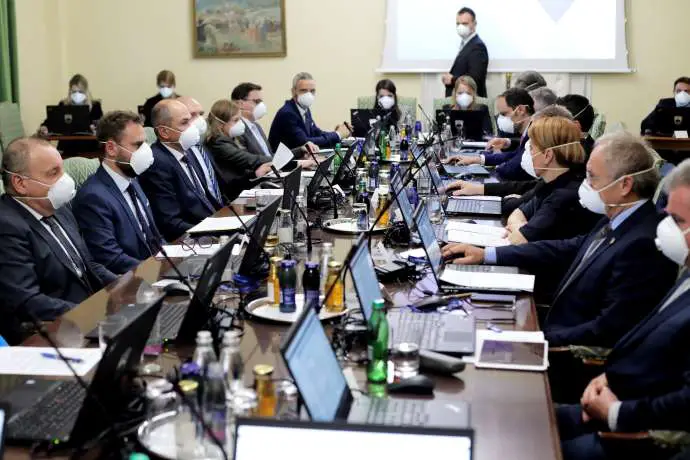STA, 21 June - Looking at the new government after its first 100 days in power, which have been marked by coronavirus measures and disputes related to them, analysts Andraž Zorko and Rok Čakš see the government firmly in the saddle, united in the face of persistent pressure that is however coming from a divided opposition.
What is usually a grace period for new governments is passing on Sunday. It has been unusually turbulent, a major factor being the coronavirus crisis and strong divisions in the political arena reflected in society at large.
The new centre-right government led by Janez Janša and his SDS (Democrats) has held a record 77 sessions so far, whose agendas have included three stimulus packages meant to mitigate the economic and social impact of the crisis, and lockdown measures, which included a ban on travel among municipalities.
Also making headlines were staffing changes at leading posts, including in the army, police, intelligence services, the supervisory board of Telekom Slovenije, the programming council of RTV Slovenija, as well as at the top of the Statistics Office.
Andraž Zorko from the pollster Valicon argued for the STA that the government looked stable after the first 100 days, "definitely more so than its predecessor", a minority centre-left government led by the Marjan Šarec List (LMŠ) and disbanded after Šarec's resignation in January.
Conservative columnist Rok Čakš feels the coalition partners are aware that any crack between them will trigger an attack and that they can only survive if they cover each other's backs, a case in point being the recent vote on Constitutional Court candidate Andraž Teršek, who failed to get appointed in the secret ballot even though some coalition parties had announced their support.
As regards potential future stumbling blocks for the government, Čakš mentioned projects that could be perceived publicly as ideological, for instance changes to media legislation. "We can also expect some behind the scenes jostling when it will come to securing influence in the emerging demographic funds and similar cost-heavy projects," he said.
Zorko on the other hand feels that the coalition partners - the SDS, New Slovenia (NSi) and the centrist Pensioners' Party (DeSUS) and Modern Centre Party (SMC) - have divided up the spheres of influence in a way that precludes a serious conflict.
"The term is short, only half the usual duration, there will not be time for major projects, especially not if one considers the upcoming EU presidency, which will shortly be followed by the new election campaign," Zorko said, while pointing to the Constitutional Court-ordered electoral reform as the only potential apple of discord.
While noting that a failure to enact electoral system changes could be used as an excuse against calling an early election in the event of an unlikely clash in the coalition, Zorko said the changes should be adopted smoothly "if they wish to restore the trust of citizens in politics and elections". "However, a high turnout is indeed not equally desired by everybody," he added.
Čakš expects the borders of electoral districts will be redrawn by the end of the year to provide a minimum solution to the court ruling. He added the SDS had already gotten what it wanted as the proposal to abolish electoral districts and introduce the preferential vote failed to win the needed majority in parliament.
Meanwhile, commenting on the government cabinet, Zorko does not see any markedly weak links, although he did single out Interior Minister Aleš Hojs, "whose statements often interfere in spheres beyond the domain of the interior minister and do not help calm the heated atmosphere, but rather have the opposite effect".
Čakš, who feels it will take a while longer to be able to asses the work of some of the ministers who were less exposed during the crisis, argued "the current situation in the country and international comparisons suggest the PM and the front-line ministers did well in the battle against this dangerous battle". "However the war is not won yet," he added.
Čakš pointed to the high public support the government enjoyed at the outset of the crisis, adding that public attention was later gripped by the reports about dubious practices in the procurement of personal protective equipment and medical ventilators.
The reports, along with PM Janša's clashes with the media, his tweets, and the government's contentions changes to environmental legislation through the targeting of NGOs, have been a key galvanising force behind continuing protests, which have seen 5,000-plus cyclists taking the streets of Ljubljana as well as some smaller towns each Friday for two months now.
Zorko highlighted the record level of aversion to the ruling SDS among voters, with a poll showing 55% would not vote for this party no matter what the circumstances. "Things looked different at the beginning, but it was already clear after two weeks that the SDS and its president remain in their traditional trenches," he said.
As for the opposition, Zorko said it became active after struggling initially, but "the divisions created among the current opposition parties by Marjan Šarec's style of rule, are still clearly visible".
Zorko moreover does not share what he says is some people's puzzlement over the opposition Left now using the same strategies in parliament as the SDS and the LMŠ copying the SDS's communication approaches.
Čakš said the left opposition has been "exerting aggressive pressure on the centre-right coalition since the very first minute, irrespective of the difficult circumstances".
"The SDS has a well-earned reputation of a tough and merciless opposition, but it did not file ouster motions within the first 100 days of new governments," he said in reference to motions filed against Economy Minister Zdravko Počivalšek over PPE procurement and Interior Minister Hojs after the ministry overrode a ban on a concert by Croatian nationalist singer Marko Perković Thompson.






